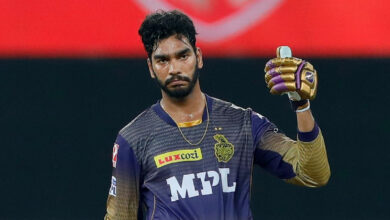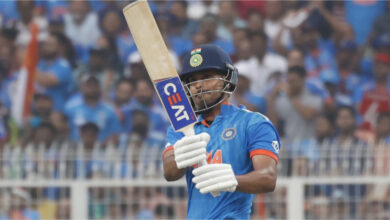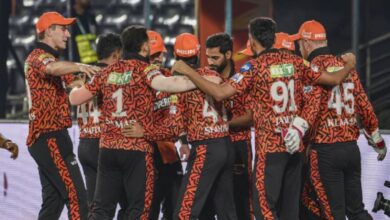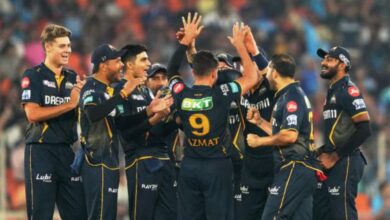Blers, Saharan sand mirages and nutribars: How an Indian ran ‘toughest race in the world’

It was after doing a 75-km desert run in Rajasthan’s Pokhran and watching a Netflix series called Losers that Mahasweta Ghosh decided that she loved the sand terrain. It emboldened her to take on the biggest challenge there is: the Marathon Des Sables (MDS), known to be the toughest race in the world.
A multi-stage, multi- day race held in the Moroccan Sahara desert, the runners have to cover approximately 256 km over seven grueling days or ‘stages’, with one of these stages being 85-90 km long. Held from April 23 to May 1 this year, Ghosh became the first Indian woman to complete the MDS, which sees a dropout rate of close to 30 per cent.
“I realised I genuinely love running in that terrain. It’s grittier, very hot, but I didn’t mind the high temperatures. In fact, I am not comfortable in the cold,” says the 44-year-old.
A multi-stage, multi- day race held in the Moroccan Sahara desert, the runners have to cover approximately 256 km over seven grueling days or ‘stages’, with one of these stages being 85-90 km long. (Express photo)
The 1,200 participants lived in tents, carried their own food, ran with bags weighing around 11 kg, and were given a maximum of 12 litres of water daily. The sand terrain meant it’s not just lace up and run.
“Running in sand needs an all-terrain shoe, because under the sand are rocky patches. Then, we wear toe socks and gaiters to stop sand from getting into the shoes. I got a lot of blers in my right foot,” Ghosh recalls.
The Marathon Des Sables (MDS) was held from April 23 to May 1 this year. (Express photo)
Ghosh, who trained road running in Gurgaon and gymming for agility and mobility, can boast that her legs never gave up on her. But it was the logics that needed quite a thought. “Not any other backpack. I needed structured gear, had to think about the right tee shirt, what to wear back in the tent, and finally the nutrition because you can only eat what you carry.”
She packed and weighed every food. “Homemade dry oats, with insta variations of nutty and chocolate, nutribars, Haldiram dehydrated daal chawal, ready-to-eat poha…”
Running on sand dunes is basically walking fast with sticks. “Typically, walking on sand takes 1.3 times the effort on regular running surfaces. You take 10 steps and slide back a few. It’s tricky with rocks under the sand. It’s like being inside a sauna. And with dunes, the concept of dance is illusory.”
Mahasweta Ghosh, who trained road running in Gurgaon and gymming for agility and mobility, can boast that her legs never gave up on her. (Express photo)
“It’s always 40-42 degrees. You drink lukewarm water. And there are sand mirages. I told myself, ‘If you see something attractive like a water body, it’s not real.’ Because hallucinations are common.”
One of the stages was a night run, a dreary prospect. “You can’t see anything. Everything is still and dressing. I needed music that night — I had created my own playl. But it was the Bhaag Milkha song which lifted my spirits.”
Carrying the bag meant the left shoulder gave her a tough time. “There was chafing and abrasions, and pain in every part of the body.” It would take her two hours to get ready daily. “Sun hat, glasses, walking stick, making sure the pouch is accessible, wearing the gaiters.”
The 1,200 participants lived in tents, carried their own food, ran with bags weighing around 11 kg, and were given a maximum of 12 litres of water daily. (Express photo)
Did she ever consider pulling out of the race? “Not once did I consider quitting. I did nothing silly, though I knew there would be dark spots and meltdowns. I decided not to react, knowing it will pass. My only fear was what if I don’t finish. This one time I hurt my left leg, went to the medical tent, put on an ointment, ate, slept. I told myself everybody is in dress, I’m not the only one suffering. Pain is part of it. It’s ok.”
Ghosh recalls the finish vividly. “It was a Bollywood-like finish. I’d dreamt of crossing the finish at MDS with the Indian flag, and I did that. It felt like I had won the World Cup for India. It was a financially expensive dream from 2019 to 2023!”
A tech marketer profession, Ghosh is a veteran of many ultra and trail runs, but this was a bigger challenge than anything she had run before. Though she carried a book along — Let Your Mind Run Deena Kastor — she didn’t find the time to read it in the competition week.
“The conversation in the tents at night (there were eight to a tent) would usually be ‘will you do MDS again?’ Because what it does to you is very different from anything else. Hell yes, can’t wait to do it again in 2024!” Ghosh says, elated. “I wanted to know if it would break me. It didn’t. It’s like a life-transformation workshop. I love the simplicity and challenge of it.”







